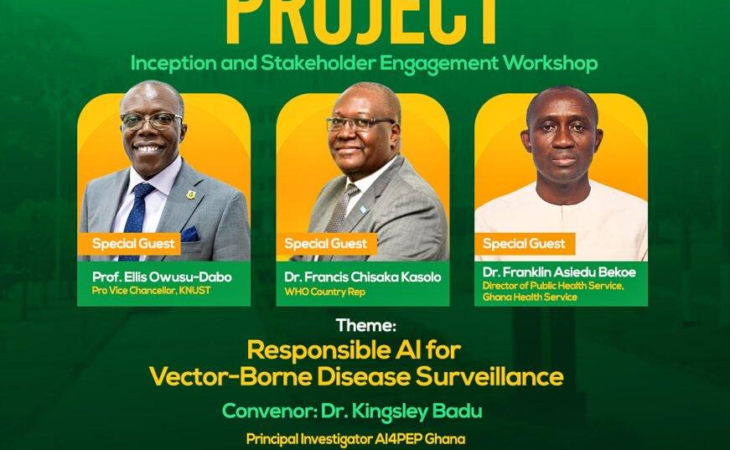
The RAPID-VBP project aims to provide a robust public health surveillance system powered by an AI-based automated vector surveillance system, with the capacity for early detection and early warning signals of potential threats to improve public health response to outbreaks.
The workshop anticipates engaging a diverse group of stakeholders, including public health officials, epidemiologists, and technologists, to explore collaborative opportunities and develop a community committed to advancing robust public health responses and surveillance strategies.
Guests of honor are:
🔹 Prof. Ellis Owusu-Dabo, Pro Vice Chancellor, KNUST
🔹 Dr. Francis Chisaka Kasolo, WHO Country Rep
🔹 Dr. Franklin Asiedu Bekoe, Director of Public Health Service, Ghana Health Service
Join us on the 20th of May, 2024 at 8:00AM as we dive deep into the world of Artificial Intelligence with the theme: “Responsible AI for Vector-Borne Disease Surveillance.”
Don’t miss out on this enlightening experience! For more information, please contact us at kingsbadu@gmail.com or call 0265012563/0200876117.
A Workshop On Personal Branding As An Online Learner

On May 7th, 2024, Rose-Mary Owusuaa Mensah Gyening, PhD facilitated a workshop titled “Branding Yourself as an Online Learner”. This workshop was part of an initiative by KNUST in collaboration with the Mastercard Foundation.
The goal of the initiative is to train E-learning ambassadors in various tertiary institutions. The workshop focused on equipping participants with the skills and knowledge to effectively present and market themselves in the online learning environment.
It emphasized the importance of building a strong personal brand to enhance their learning experience and career prospects in the digital age.
The passage outlines a specialized workshop focused on data analytics using Power BI, facilitated by Rose-Mary Owusuaa Mensah Gyening. The participants of this workshop were primarily professionals from one of the largest government hospitals in Ghana, indicating a targeted effort to enhance the skills of healthcare workers in data management and analytics.

The workshop’s content appears to have been in-depth, tackling the complex task of interpreting vast amounts of healthcare data. The goal was to equip the attendees with the knowledge and tools needed to extract meaningful insights from data, which could then be applied to improve healthcare management. This includes understanding patterns of illness, resource utilization, patient outcomes, and operational efficiency.
By using Power BI, a robust business analytics service provided by Microsoft, Dr. Gyening likely guided the participants through processes such as data visualization, generating reports, and creating dashboards that are crucial for making informed decisions in healthcare settings. This software is particularly valued for its ability to allow users to integrate various data sources and present complex data in an accessible and actionable manner.
This workshop underscores the increasing relevance of data analytics in healthcare, empowering professionals to use data-driven approaches for better decision-making and strategic planning in medical environments.